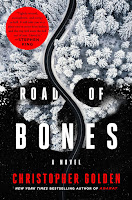Spooky season wouldn't be complete without a fresh addition from Riley Sager to send shivers down your spine. His knack for crafting tightly woven thrillers tinged with a hint of horror has consistently captivated my imagination and evoked my deepest fears ever since I first encountered his writing in The Last Time I Lied back in 2018. Since then, I've made it a point to eagerly devour each of his new releases, with only a couple slipping through the cracks in recent years. Determined to make up for these missed opportunities, I've been patiently awaiting the arrival of his latest work, The Only One Left, courtesy of my local library. Fortunately, my hold has finally materialized just in time for the end of the month, providing the ideal moment to immerse myself in another Sager chiller.
Embedded within the mythology of Maine is the bone-chilling saga of Lennora Hope, a tale that has gripped the imaginations of both children and adults since its sinister unfolding on a fateful night in 1929. As the lore goes, Lennora, a mere seventeen years old at the time, experienced a catastrophic unraveling of her sanity, culminating in a gruesome spree that claimed the lives of her parents and sister. Though the general consensus seems to implicate young Lennora in the tragedy, the police could never definitively establish her guilt. In the wake of the bloodshed, Lennora staunchly denied any involvement. To this day, she has neither uttered a public word about the gruesome events nor crossed the threshold of Hope's End, the cliffside mansion that became the grim stage for the massacre.
"At Hope's End, the past is always present."
Fast forward to the year 1983. Kit McDeere finds herself presented with an unexpected opportunity to resurrect a career she had believed to be permanently tarnished. Once a home health aide, Kit's professional life was marred by allegations of wrongdoing in the tragic passing of her own mother. In the twilight of a protracted battle against a grave illness, Kit was implicated in her mother's untimely demise. Now, Kit's life takes an unforeseen turn when she is entrusted with the care of local legend Lennora Hope. The task falls to her after Lennora's previous nurse abruptly departs Hopes End, abandoning her enigmatic patient and all associated responsibilities. While Kit harbors reservations about assuming this role, she has little choice. Reluctantly, she accepts the role of the primary caregiver to a woman who she suspects may be a murderer.
Upon her arrival at Hope's End, Kit is confronted by a deteriorating compound perched precariously atop a cliff, gradually inching toward the tumultuous waves below. Instead of encountering the ruthless killer that has haunted her nightmares, Kit comes face to face with a 70-year-old woman whose mobility and speech have been ravaged by a series of strokes. Lennora's communication is now restricted to simple yes or no responses and the slow typing of an antique typewriter. As Kit becomes settled into her role, she is taken aback by a note that Lennora laboriously types out for her. In an unexpected turn, Lennora divulges the full extent of her story, recounting each moment that contributed to her legendary status. As the two women embark on a journey to unearth the secrets of that fateful night, Kit begins to suspect that Lennora's narrative might be far from complete. Beneath the facade of the seemingly benign woman in her care lies the potential for hidden dangers that Kit could never have anticipated.
In The Only One Left, Riley Sager once again demonstrates his mastery of suspense, expertly manipulating our expectations and delivering unexpected twists. Set in the 1980s, the analog atmosphere intensifies the sense of dread and mystery. While I couldn't help but notice similarities to Colleen Hoover's Verity, Sager's narrative remains distinct and captivating. The eerie ambiance of the manor and the intricate storyline drew me in completely. The novel's conclusion is shocking and satisfying, making it a must-read for the spooky season. I'll be eagerly anticipating whatever chilling tale Sager comes up with next.
For more information, visit the author's website, Amazon, and Goodreads.
(2023, 72)















